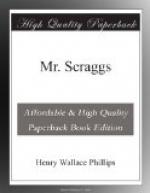“Well. there old Scraggs—I say ‘old,’ but the man weren’t more than forty—celebrated his eighty-first marriage in that old bull-pen, and they lived as happy ever after as any story book. Which knocks general principles. Probably it was because that no man was ever treated whiter than she treated him, and no woman was ever treated whiter than he treated her; he had the knack of bein’ awful good and loving to her, without being foolish. Experience will tell, and he’d experienced a heap of the other side.
“And now, what do you think of Aleck? The scare we threw into him that night wound up his moanin’ and grievin’ about the other girl. He never cheeped once after that, but got fat and hearty, and when I left the ranch he was makin’ up to a widow with four children, as bold as brass. There was more poetry in E. G. W, than there was in Aleck, after all.”
II
IN THE TOILS
Mr. Ezekiel George Washington Scraggs, late of Missouri, later of Utah, and latest of North Dakota, stood an even six-foot unshod. He had an air of leanness, almost emaciation, not borne out by any fact of anatomy. We make our hasty estimates from the face. Brother Scraggs’s face was gaunt. Misfortune had written there, in a large, angular hand, “It might have been”—those saddest words of tongue or pen. The pensive sorrow of E. G. W.’s countenance had misled many people—not but what the sorrow was genuine enough (Scraggsy explained it in four words, “I’ve been a Mormon"), but the expression of a blighted, helpless youth carried into early middle age was an appearance only: I mean it was nothing to bank on in dealing with Zeke. Still, if you could see those eyes, dimmed with a settled melancholy; those mustachios, which, absorbing all the capillary possibilities of his head, drooped like weeping willows from his upper lip; and above, the monumental nose—that springing prow that once so grandly parted the waves of adverse circumstance, until, blown by the winds of ambition, his bark was cast ruined on the shores of matrimony—you would not so much blame the man who mistook E. G. Washington Scraggs for a something not too difficult. Red Saunders said that Scraggsy looked like a forlorn hope lost in a fog, but when you came to cash in on that basis it was most astonishing. In general a man of few words, on occasions he would tip back his chair, insert the stem of his corncob pipe in an opening provided by nature at the cost of a tooth, and tell us about it.
[Illustration: “Scraggsy looked like a forlorn hope lost in a fog.”]
“Why can’t people be honest?” said Mr. Scraggs—Silence!
“Charley!” cried Red, reproachfully, “why don’t you tell the gentleman?”
“No, no, no!” replied Charley. “You be older’n me, Red—you explain.”
“Well,” said Red, “I suppose the loss of their hair kind of discourages ’em.”




